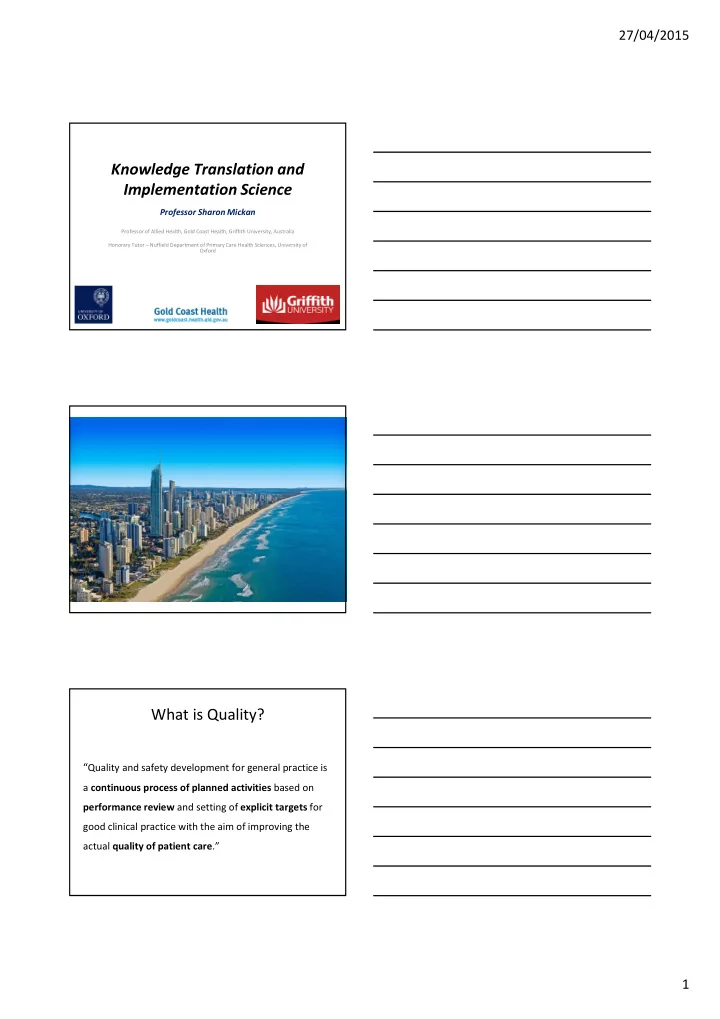

27/04/2015 Knowledge Translation and Implementation Science Professor Sharon Mickan Professor of Allied Health, Gold Coast Health, Griffith University, Australia Honorary Tutor – Nuffield Department of Primary Care Health Sciences, University of Oxford What is Quality? “ Quality and safety development for general practice is a continuous process of planned activities based on performance review and setting of explicit targets for good clinical practice with the aim of improving the actual quality of patient care .” 1
27/04/2015 Working with Quality Members of EQuiP base their work on quality improvement and patient safety being; � ����������������������������� � ��������� � ������������������������������������ � �� ������������������������������������ � �������������������������������� � ��������������� � ������������� ����������������������������������� � ����������������� ������������������� ���������� ��������� ��������������� � ������������������!������ � "����������� Improving Quality How are you improving quality of patient care? How do you know this? Improving Quality the combined efforts of healthcare professionals, patients and their families, researchers, payers, planners and educators—to make the changes that will lead to better patient outcomes (health), better system performance (care) and better professional development (learning). • all improvement involves change, BUT not all changes are improvement. • how can we be sure that the changes we make systematically incorporate high QUALITY research knowledge? Batalden & Davidoff, What is ''quality improvement'' and how can it transform healthcare? Qual Saf Health Care 2007 16: 2-3 2
27/04/2015 Knowledge translated into action? Is this sufficient? Research implemented in practice? Why? - Current challenges Published research is insufficient • – poorly designed, reported Clinical environments are not uniform • geography, policy, organisations, culture – Research evidence is necessary but insufficient to improve • practice – Tacit knowledge, routine data, experience Limited evidence re how translate knowledge into action • – Health, management, psychology, sociology, education 3
27/04/2015 What and How? - Current challenges Results from this study show that all regular exercise training (regardless of type of exercise, intensity, length of intervention, or supervision) improves aerobic capacity , but it also showed that when aiming to increase aerobic capacity as effectively as possible in adults with CKD the following exercise regimen is recommended: 4-6 months supervised, regular (3 sessions/week) high intensity mixed cardiovascular and resistance training lasting 30 to 90 minutes . To maintain this peak effect the patient has to continue with the regular exercise training intervention . Modes of activities that were shown to improve aerobic capacity in adults with CKD were activities that use large muscle groups and that can be maintained continuously, such as cycling, walking, and jogging . Research-practice Gap Disconnect between Knowledge and Action Gap between what we know and what we do What type, intensity, Systematic review frequency, duration? recommends regular How do we introduce, exercise training monitor, sustain regular exercise? Research to practice pipeline 4
27/04/2015 Using knowledge to cross the ‘gap’ Use the knowledge of evidence-based medicine • – research evidence – clinician expertise – patient needs, wants, expectations Consider local context, policy, habits • Build research knowledge about what works • – knowledge translation Research evidence Patient Local needs, Context values Clinician experience What is Context Everything that impacts on how we create, use knowledge Includes Organisational culture ‘ way things are done ’ • Resources • Tools, systems, processes • Leadership and governance • – Influenced by power, politics, policy 5
27/04/2015 Building a conceptual model Knowledge is derived from… Forms of knowledge Research evidence Clinician knowledge, skills, experience Patient values, choice, engagement Adapt knowledge to context Forms of Knowledge Local Context Research evidence Local, national policy Organisational setting Clinician knowledge, Environment resources skills, experience Staffing profile Patient values, choice, Work practices engagement It is often unclear how to identify, and map what is important Assess barriers to knowledge use Knowledge Local Context Barriers Research Local, national Lack of awareness evidence policy Organisational Lack of agreement setting Clinician Environment Low self-efficacy knowledge, resources skills Staffing profile Environmental factors Patient values, Work practices Patient factors choices Barriers often related to research evidence & contextual factors 6
27/04/2015 Select, Tailor, Implement an Intervention Knowledge Local Context Barriers Implement Research Local, national Lack of Engage evidence policy awareness stakeholders Organisational Lack of Leadership & setting agreement support Clinician Environment Low self-efficacy Change knowledge, resources management skills Staffing profile Environmental Stable teams factors Patient values, Work practices Patient factors Education & choices training The Knowledge to Action Cycle What is Knowledge Translation • � ������������������������������ �������������� ������������������������������������������������� ������������������������������ ��� ������������ ������� ������������������������ ���������������������� ������������� ���������������������������������������� ������� Canadian Institutes of Health Research In other words… • ���� ����������������������������������������������� ������������������ ����������������������������� ����������������������������������������� �������� ��������� ���� ������������������������������������� ������ KT Program, Faculty of Medicine, University of Toronto, 2004 7
Recommend
More recommend